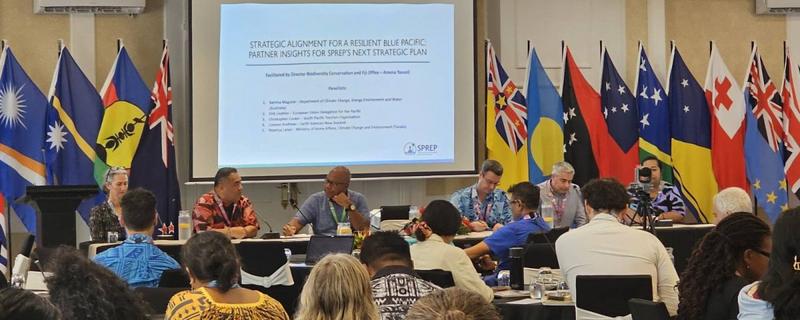The Pacific Tourism Organisation (SPTO) has reaffirmed its commitment to regional collaboration, urging Pacific leaders to recognise tourism not only as an economic sector vulnerable to global shocks but as a strategic tool for resilience, sustainability, and Pacific-led prosperity.
At the 32nd Meeting of the Secretariat of the Pacific Regional Environment Programme (SPREP) in Apia, SPTO Chief Executive Officer Christopher Cocker commended SPREP as a “fellow CROP agency and strategic partner” in delivering Goal 4 of the Pacific Sustainable Tourism Policy Framework: “Protecting our ecosystems through accelerated climate action and resilience building.”
He acknowledged the importance of donor-supported initiatives that integrate environmental safeguards into tourism. These include Environmental Impact Assessments for coastal tourism projects, guidelines for environmental audits of hotels, and waste management programmes such as the Pacific Ocean Litter Project, which is phasing out single-use plastics. Biodiversity protection efforts, supported through the Pacific Bioscapes Programme, have also produced responsible wildlife viewing guidelines to ensure visitor experiences remain sustainable and respectful.
“SPTO expresses its deep appreciation for SPREP’s leadership and reaffirms its commitment to future collaboration with SPREP teams and regional partners to advance environmental sustainability across the tourism sector,” Cocker said.
At the Pacific Islands Forum Leaders Dialogue in Honiara, Cocker broadened his message, calling on governments to position tourism as a driver of resilience rather than as a weakness. “Tourism remains vulnerable to climate change, natural disasters, pandemics, and geopolitical shocks,” he said. “Yet its greatest untapped potential is in its ability to protect communities, ecosystems, and cultural heritage — if we choose to lead with vision.”

Among the challenges, Cocker cited limited air connectivity, infrastructure pressures, and risks to ecosystems and cultural heritage. “Aviation and tourism are interconnected. Improving air links will unlock economic opportunities across our Blue Pacific. But this must be complemented by coordinated efforts to address ecosystem degradation and cultural erosion,” he said.
He also stressed the need for digital inclusion, particularly for small and community-based operators. “Without targeted support, digital transformation risks leaving our smallest operators behind. Inclusion must be deliberate.”
Calling for stronger political leadership, Cocker urged Forum Leaders to maintain support for SPTO’s independence and operational agility. “To fulfil our mandate, SPTO must stay agile, inclusive, and aligned with regional development goals. Our stakeholders are engaged, our structure is solid, and our impact is growing.”
For SPTO, tourism must evolve towards regenerative models grounded in climate resilience, cultural integrity, and fair benefit-sharing. As the Pacific’s lead tourism body, it continues to partner with UN Tourism and regional agencies such as SPREP to ensure that tourism contributes to resilience, prosperity, and Pacific identity for generations to come.
“Tourism is more than an economic driver. It bridges cultures, communities, and economies. The Pacific is not just a destination — it is a vibrant mosaic of ocean-bound identities. Guided by Pacific values, tourism can be a force for resilience and inclusive prosperity,” Cocker said.










